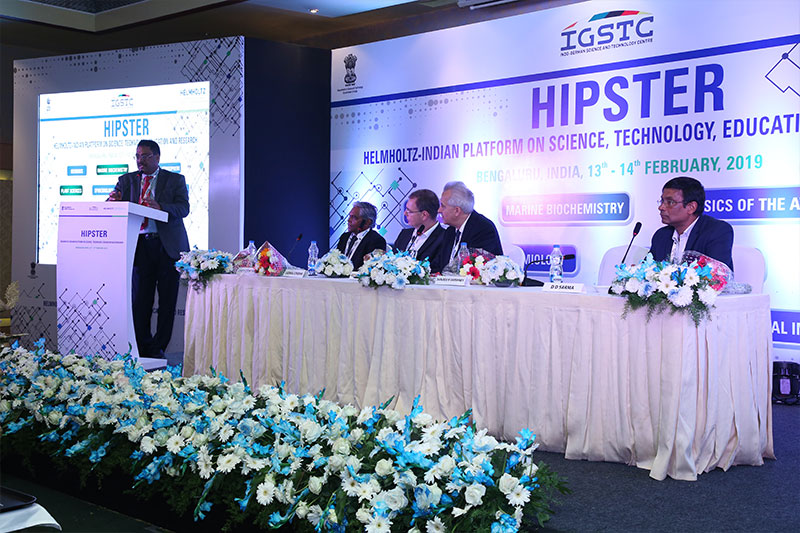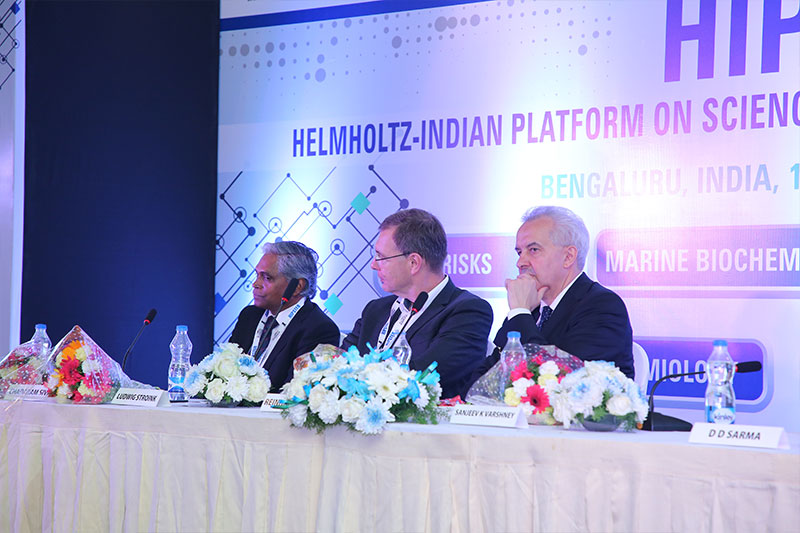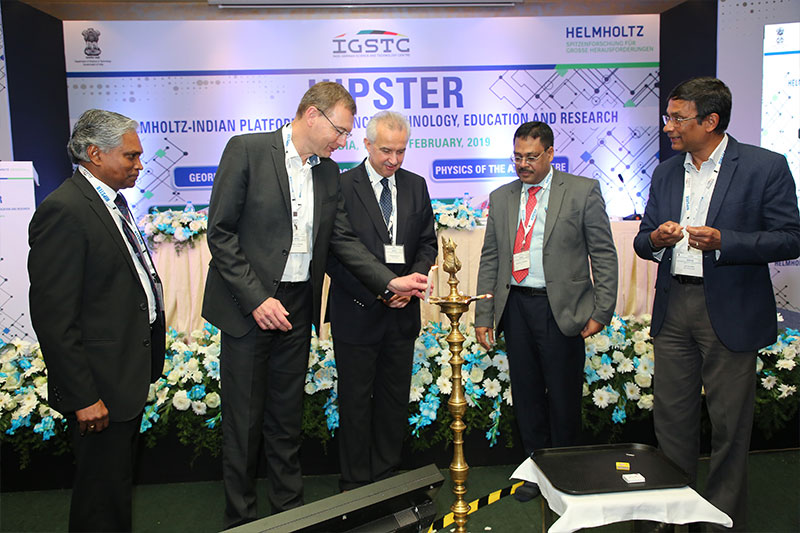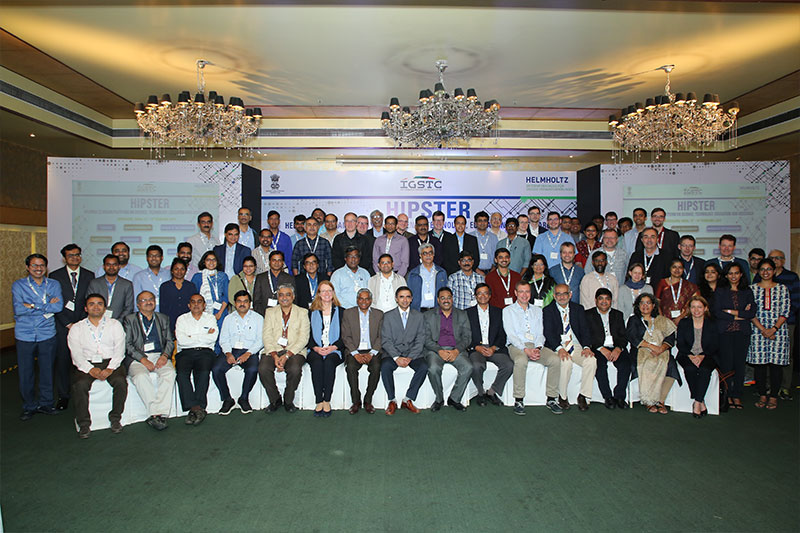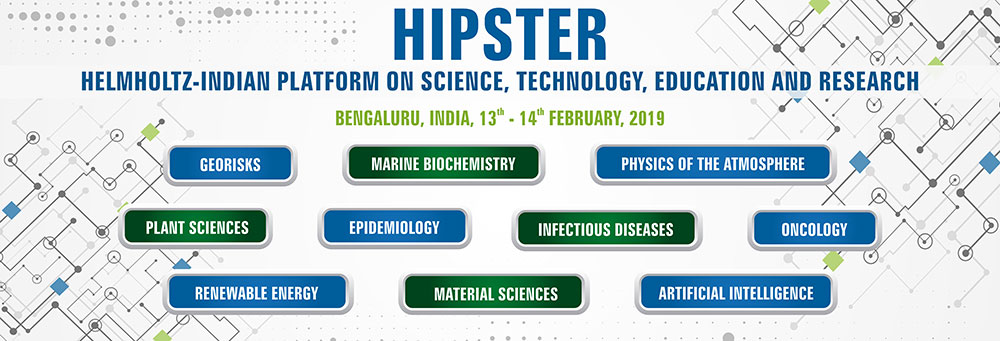
Helmholtz-Indian Platform on Science, Technology, Education and Research (HIPSTER) workshop was organised on 13th – 14th February 2019 in Bengaluru, India. HIPSTER results from an agreement between Dr. Harsh Vardhan, Hon’ble Minister of the Ministry of Science & Technology, Ministry of Environment, Forest and Climate Change, and Ministry of Earth Sciences, Government of India, and Prof. O. Wiestler, President of the German Helmholtz Association, the largest non-university research organization in Germany. The agreement was also subject of the 11th Meeting of the Indo-German Committee on Science & Technology (WTZ) in Berlin in May 2017, where both, the German Ministry for Education and Research (BMBF) and the Indian Department for Science and Technology (DST) acknowledged the agreement, and further entrusted its organisation and funding to Indo-German Science & Technology Centre (IGSTC).
A new India Germany cooperation, Helmholtz Indian Platform on Science, Technology, Education and Research (HIPSTER) was conceived & first meeting was held in Bangalore during 13-14 Feb. 2019. pic.twitter.com/4FNUHoOGEH
— DSTIndia (@IndiaDST) February 14, 2019
The overall idea of HIPSTER is to foster the bilateral collaboration with a special focus on Young Talents. It will provide the platform to discuss current developments in R&D in both countries and to work together on ideas on how to promote a cross-disciplinary exchange and on how to open new channels for research and innovation. The goal of the workshop is to develop future-oriented ideas for further interaction and research cooperation between the Helmholtz Association and Indian research institutes and universities.
Structure of the workshop: To guarantee a structured discussion, seven promising subtopics from the Helmholtz portfolio - Georisks/Landslides-Marine Biochemistry, Physics of the Atmosphere, Plant Sciences Epidemiology/Infectious Diseases/Oncology, Renewable Energy, Material Sciences and Artificial Intelligence with mutual interest for both countries were identified. Each subtopic will be co-chaired by leading Indian and German scientists.
The workshop format consisted of a mix of keynote overview presentations and breakout sessions. Director, IGSTC welcomed the distinguished guests and the participants. Inauguration of the workshop was done by Prof Reinhard Hüttl, Vice President, Helmholtz Association and Mr Sanjeev Kumar Varshney, Head, IBCD, Department of Science & Technology, Government of India. Prof Hüttl welcomed the participants and gave an overview of the workshop. He stressed the need for developing significant ideas to be taken up for future collaborations between India & Germany. Mr. Varshney while welcoming the participants, talked about various initiatives and programmes of DST and role of IGSTC in furthering Indo-German collaborations. He stressed the need for preparing a White Paper and Vision Document to carry forward collaboration between DST & Helmholtz and also through IGSTC. Director, IGSTC presented an overview of IGSTC activities. He explained the various funding programmes of IGSTC and the role IGSTC playing in growing research partnership between India & Germany. Dr Ludwig Stroink, International Division, Helmholtz Association presented various funding opportunities available through Helmholtz. Dr Martin Goller, DLR-PT summarized the programmes of Federal Ministry of Science & Technology (BMBF), Government of Germany. Dr Heike Mock, German Academic Exchange Service (DAAD) Regional Office, New Delhi briefed on other funding opportunities existing for Indian students and researchers in Germany.
Abt 70 Indian & German scientists participated, led by @skvdst1, Head Intl Bilateral cooperation DST & Dr Reinhard Huttl, VP, Helmholtz to explore cooperation in Georisks, biochem, physics of atm, plant science, #renewableenergy , #ArtificialIntelligence , #Medical #science. pic.twitter.com/gXs6qLsSqo
— DSTIndia (@IndiaDST) February 14, 2019
Overview presentations - given by the respective Co-Chairs - introduced the specific subtopics. Each subtopic was Co-chaired by leading scientists from India & Germany. Participants in the sub-topics were from leading Helmholtz institutes, IISc, IITs, IISERs, CSIR labs, Central universities of India and leading Medical Research Centers of India.
The sub-topics were further discussed in-depth and developed in thematic breakout sessions. The workshop itself was covered in two full days and was organized around the following lines:
As a final result of the workshop, a “White Paper” will summarize the output of the discussions. It will be handed over to Helmholtz and DST as a potential agenda for future collaboration and/or further arrangements.

